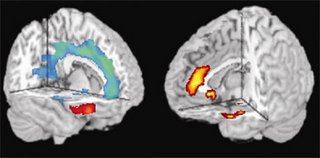3/21/2006
Aggression-Related Gene Weakens Brain’s Impulse Control Circuits
A version of a gene previously linked to impulsive violence appears to weaken brain circuits that regulate impulses, emotional memory and thinking in humans, researchers at the National Institutes of Health's (NIH) National Institute of Mental Health (NIMH) have found. Brain scans revealed that people with this version — especially males — tended to have relatively smaller emotion-related brain structures, a hyperactive alarm center and under-active impulse control circuitry. The study identifies neural mechanisms by which this gene likely contributes to risk for violent and impulsive behavior through effects on the developing brain.
"These new findings illustrate the breathtaking power of 'imaging genomics' to study the brain's workings in a way that helps us to understand the circuitry underlying diversity in human temperament," said NIH Director Elias A. Zerhouni, M.D., who conducted MRI studies earlier in his career.
"By itself, this gene is likely to contribute only a small amount of risk in interaction with other genetic and psychosocial influences; it won't make people violent," explained Meyer-Lindenberg. "But by studying its effects in a large sample of normal people, we were able to see how this gene variant biases the brain toward impulsive, aggressive behavior."
The gene is one of two common versions that code for the enzyme monoamine oxydase-A (MAO-A), which breaks down key mood-regulating chemical messengers, most notably serotonin. The previously identified violence-related, or L, version, contains a different number of repeating sequences in its genetic code than the other version (H), likely resulting in lower enzyme activity and hence higher levels of serotonin. These, in turn, influence how the brain gets wired during development. The variations may have more impact on males because they have only one copy of this X-chromosomal gene, while females have two copies, one of which will be of the H variant in most cases.
The weakened regulatory circuits in men with L are compounded by intrinsically weaker connections between the orbital frontal cortex and amygdala in all men, say the researchers.
NIMH: Aggression-Related Gene Weakens Brain’s Impulse Control Circuits

"These new findings illustrate the breathtaking power of 'imaging genomics' to study the brain's workings in a way that helps us to understand the circuitry underlying diversity in human temperament," said NIH Director Elias A. Zerhouni, M.D., who conducted MRI studies earlier in his career.
"By itself, this gene is likely to contribute only a small amount of risk in interaction with other genetic and psychosocial influences; it won't make people violent," explained Meyer-Lindenberg. "But by studying its effects in a large sample of normal people, we were able to see how this gene variant biases the brain toward impulsive, aggressive behavior."
The gene is one of two common versions that code for the enzyme monoamine oxydase-A (MAO-A), which breaks down key mood-regulating chemical messengers, most notably serotonin. The previously identified violence-related, or L, version, contains a different number of repeating sequences in its genetic code than the other version (H), likely resulting in lower enzyme activity and hence higher levels of serotonin. These, in turn, influence how the brain gets wired during development. The variations may have more impact on males because they have only one copy of this X-chromosomal gene, while females have two copies, one of which will be of the H variant in most cases.
The weakened regulatory circuits in men with L are compounded by intrinsically weaker connections between the orbital frontal cortex and amygdala in all men, say the researchers.
NIMH: Aggression-Related Gene Weakens Brain’s Impulse Control Circuits